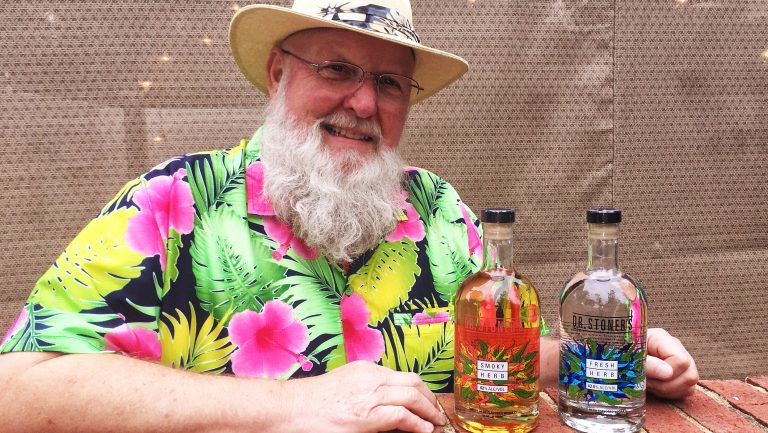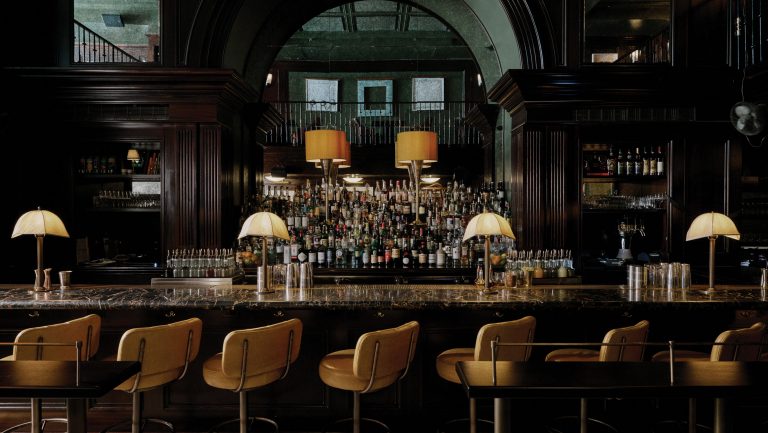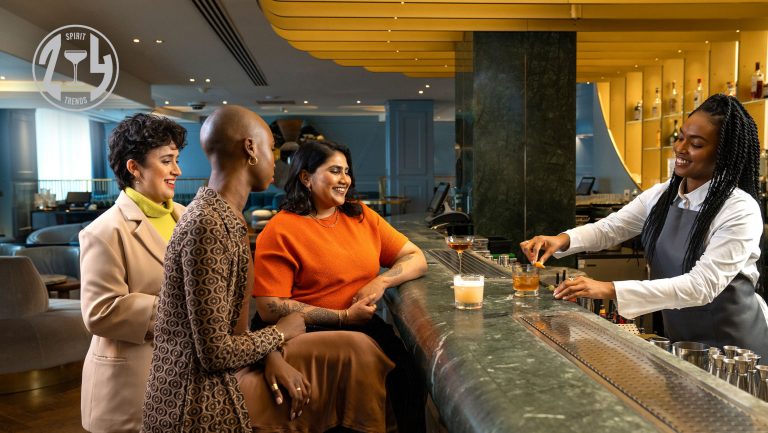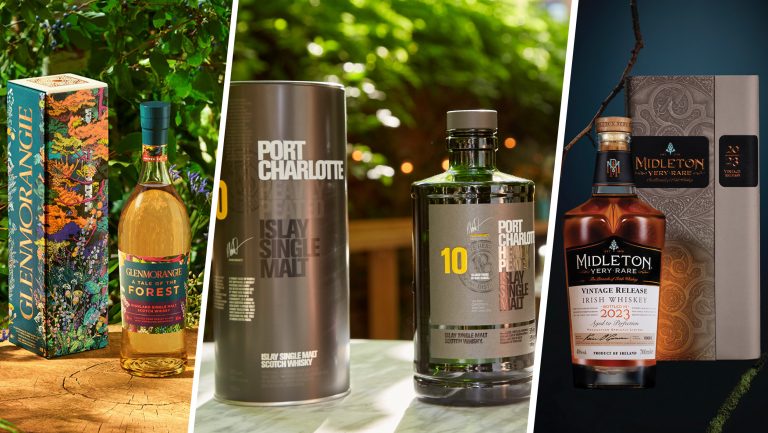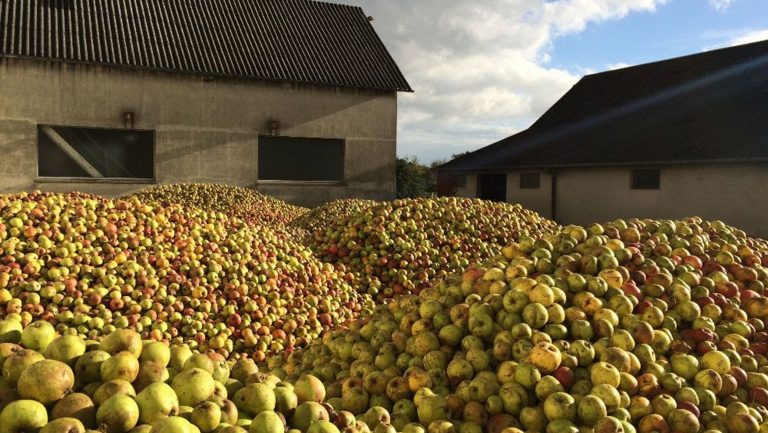The first thing you need to know about Dr. Stoner’s herbal liquors is that the brand was actually founded by someone named Stoner—Craig Stoner, in fact, who is being literal when he says, “I’ve always been a Stoner.” Also, he’s actually a doctor—technically, a retired dentist who lives in southwest Virginia. He’s agreeable and bald, with a white, Santa-like beard and—I kid you not—twinkly eyes.
About seven years ago Stoner was on a bicycle tour through the Badlands of South Dakota when he stopped at a bar at the end of a long day to slake his thirst, which led to some discussions. “The waitress had a gold marijuana leaf necklace on, and had ‘420’ tattooed on her wrist,” he recalls. “I asked, ‘What’s that all about?’”
She explained. “So I’m sitting there drinking my beer, just kind of thinking about it,” Stoner says. “I’d been interested in distilling and beverages, and I thought, What about something to get those two worlds together?”

Don’t miss the latest drinks industry news and insights. Sign up for our award-winning newsletters and get insider intel, resources, and trends delivered to your inbox every week.
Fast forward a few months after this encounter. Stoner was on an airplane this time when he struck up a conversation with a man in his row. The man was David Baxter, a civil engineer who happened to live in the Virginia hills as well, just 45 minutes from Stoner’s home. Baxter had also been trying to figure out a way to get into distilling. “I thought I’d invent the next great five-grain bourbon,” Baxter says. But he’d hit a familiar barrier when he discovered “it’s a rich man’s game.” As Stoner and Baxter talked, an idea was born: a sourced, herb-scented and flavored spirit to appeal to those whose choice of intoxicant was somewhat ambiguous.
The pair experimented extensively to get an aroma and flavor that smelled just like, well … top-notch weed. One major obstacle was that they couldn’t use actual weed. “We wanted to make sure anyone drinking it could show up for a random drug test and nothing would show up because nothing was wrong with it,” says Stoner. “Anyway, the TTB [Alcohol and Tobacco Tax and Trade Bureau] won’t allow anything illegal to go in it, so we can forget about using the real stuff. But we thought that with a certain mixture of herbs, maybe we could get the same sort of aroma and maybe the same kind of flavor to it.”
Stoner and Baxter started by infusing hops and various botanicals in an effort to capture the spirit of the herb. They got close, but not close enough. So they sought professional help and hired well-known beverage flavor developer David Dafoe at Flavorman in Louisville, Kentucky, to help concoct an accurate aroma and taste profile.
Stoner says they worked through 100 or more combinations, adjusting sugar and flavoring levels. “We wanted something that could be used in normal vodka drinks, that doesn’t overwhelm,” Stoner says, “but that would also be good on its own.” Once they nailed down a formula—tasty and evocative of fresh weed but not of stale bong water—they hired Flavorman to produce and bottle their first round at a small-scale production facility.
Two products—Dr. Stoner’s Fresh Herb Vodka and Dr. Stoner’s Smoky Herb Whiskey (both 84 proof)—launched this past spring and are available in Virginia, Kentucky, and Washington, D.C. The brand is hoping to expand into Maryland, West Virginia, and North Carolina in the next year. “We’re sticking to the mid-Atlantic right now,” Stoner says. The price ranges from $24 to $30 for a 750-milliliter bottle, depending on the state. The label features a bit of green foliage, but not the familiar seven-leaved bit of foliage—it’s more abstract.
With the legalization of recreational marijuana in several states, there’s been some speculation about legalized weed and spirits joining up and being sold commercially. (Hemp-based vodka and gin are already on the market, although hemp is not marijuana and it’s not psychoactive.) Many consumers have already figured out how to infuse their own liquor—poking around on Google leads to much information involving double boilers and whipped-cream whippers.
So are Stoner and Baxter laying the groundwork for selling a psychoactive spirit if it ever becomes legal to vend THC-infused liquor? They don’t dismiss the possibility, but they also see it as exceedingly unlikely, at least in the foreseeable future. “The latest we’ve heard from the Trump administration,” says Stoner, “is no—they don’t want to go that way.”
Regardless of the political winds, Dr. Stoner’s herbal liquors have already been discovered by cocktail makers, especially in D.C., where they are used in slyly named drinks like the Kronic Tonic, Seeds and Stems, and Midnight Brambler (see recipe). Stoner and Baxter have been pleasantly surprised to find that several high-end bars and restaurants have also embraced their spirits.
But their main marketing push to date has been promoting Dr. Stoner’s as a chilled shot—taking a page out of the Jägermeister and Fireball playbooks. Says Baxter, “Our branding is ‘Chill it, pour it, shoot it,’”
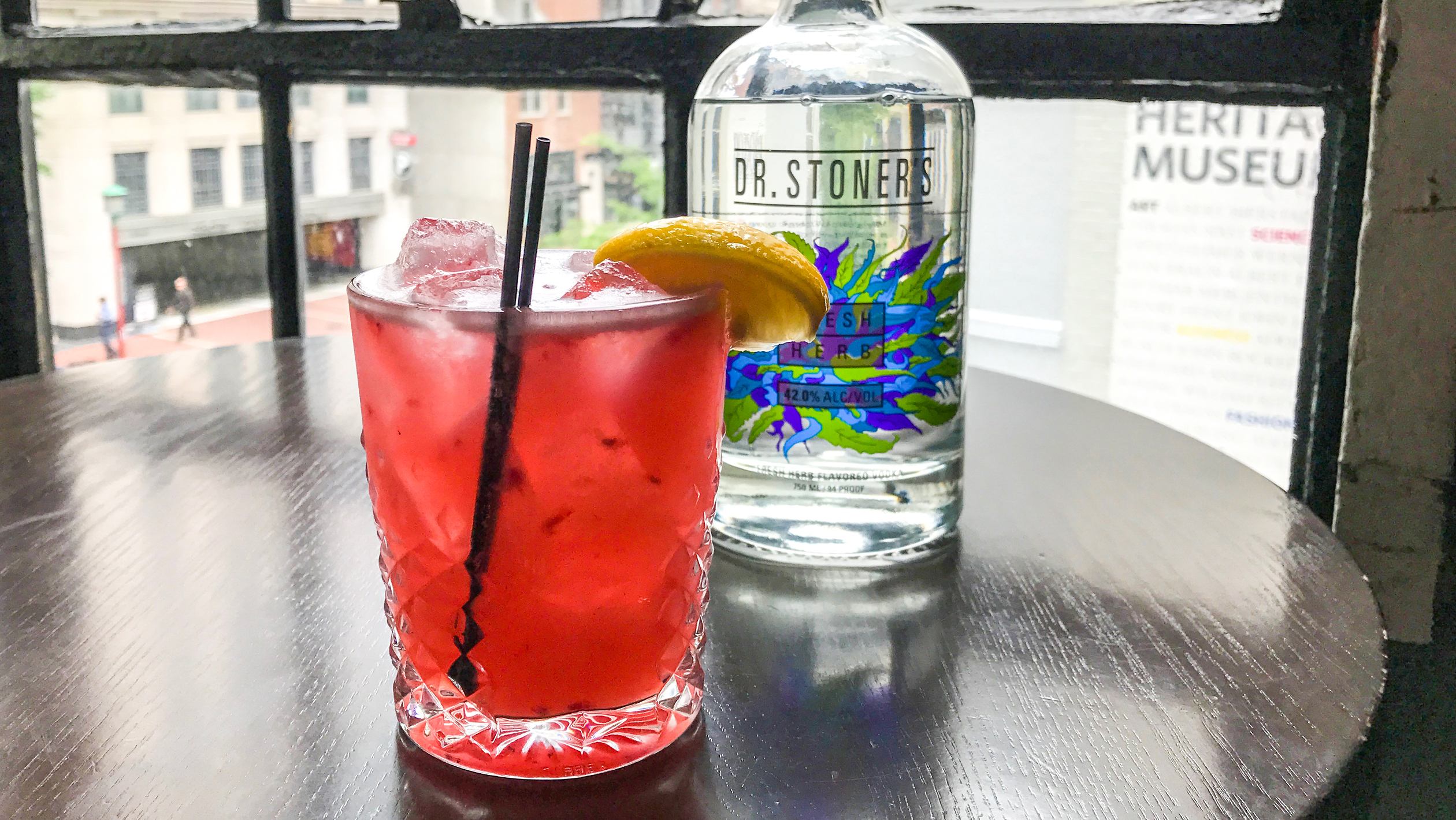
Recipe: Midnight Brambler
Created by Michael Rovezzi at Bar Deco in Washington, D.C.
Ingredients
- 3 to 4 raspberries
- ½ ounce lemon juice
- ½ ounce agave syrup
- 1½ ounces Dr. Stoner’s Fresh Herb Vodka
- soda water, to top up
Preparation
Add raspberries, lemon juice, agave syrup, and vodka to a cocktail shaker. Add ice and shake until chilled. Strain over ice into a Collins glass. Top up with soda water.

Dispatch
Sign up for our award-winning newsletter
Don’t miss the latest drinks industry news and insights—delivered to your inbox every week.
Wayne Curtis is the author of And a Bottle of Rum: A History of the New World in Ten Cocktails and has written frequently about spirits for The Atlantic, Imbibe Magazine, Punch, The Daily Beast, and Garden & Gun, among others.

